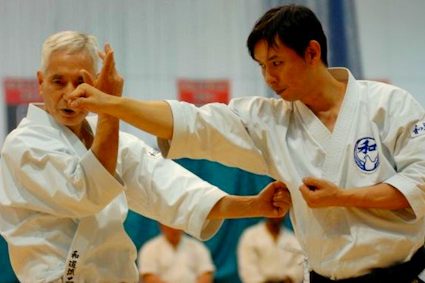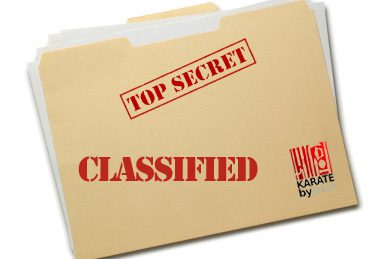Every day, we’re confronted with claims that others present as fact.
Both in and out of the dojo.
Some of these statements are easily debunked, and some are obviously true, but some are always extra difficult to get to the bottom of.
- Is your sensei lecturing you on how to develop the mythical “touch of death”, or “no-touch K.O”?
- Is your sensei telling you some story on how you can “never wash you black belt”, because it’s imbued with “chi/ki power“?
- Is your sensei showing you some secret bunkai that was allegedly designed specifically for “escaping thirty-six blood-thirsty samurai warriors on a muddy rice field under the moon”?
- Is your sensei, bluntly speaking, talking out of his ass?
Sometimes he/she might be.
And that’s when you need to switch attitude – from mindless sensei worshiping to raw analytical thinking.
Personally, I prefer to use my old pal Science.
And sure, sometimes it can be tricky to determine if a controversial statement – especially an obscure one – is scientifically true or not, but it’s not too difficult once you start to get the hang of it.
(Just for the record; no, your nose bone cannot get “shoved into your brain” from an upward strike. It will just be crushed, since it’s made of cartilage. You, 1 – Urban Myth, 0.)
Luckily, since we live in a relatively connected world, most modern people have developed a healthy dose of skepticism that keeps us from being duped by things that don’t pass the smell test. But it’s not enough to just think something might not be true – we need to know. Or, what if you actually think a statement might be true and you want to learn more? What if you want to respond to an assertion or engage in conversation but you don’t know enough to do so? What if you don’t feel like a true Karate Nerd™ at times?!
Don’t worry, dear reader.
That’s what this article is all about.
Disclaimer: Publicly questioning authority (i.e. your sensei) is considered highly taboo in any traditional dojo (especially in Japan/Okinawa), where strict Confucian ideals still reign supreme. Sometimes it’s smarter to be respectful than to be right. I’m just sayin’.
First, Try to Resist Confirmation Bias.
Before we get into what you should do when confronted with a statement that you’re actually curious about, the first thing you need to do is avoid confirmation bias. Avoid it like the plague.
Confirmation bias basically means finding an answer you already believe in.
Which is so, so, so very common in Karate.
See, if someone has a question about a belief or opinion — say, that Karate was originally developed by oppressed farmers and peasants — then when they look it up they’ll tend to be biased toward the sources that have information they already agree with. This is a well-known effect, and is one reason some things in society (like anti-vaccination beliefs) are strong even in well-educated circles. Sure, the people are smart enough to look up and understand what they read, but often they’re perhaps not experienced enough in critical thinking to evaluate what they’re reading without some amount of bias.
This is a problem.
So how do you beat back evil confirmation bias?
Well, even with experience in the field, it’s incredibly tough to do. You really need to have a mind like a parachute (they work best when they’re open!).
- First of all, be aware that confirmation bias exists.
- Then, shake yourself of your natural tendency to draw a conclusion before you’ve thoroughly researched a topic.
- Third, keep being open to new information that falls on either side of a statement.
In other words, always keep an open mind, seek evidence that contradicts every opinion (especially ones you already believe), and don’t treat your research like a frickin’ crusade.
Does this require some extra work?
Sure it does.
But once you’ve walked that extra mile, you can sleep well – knowing that you’ve done your best to find out the truth.
How To Get Some Serious Hobby Research Done.
All right.
So somebody, perhaps your sensei, one day tells you that the numerous high kicks from Shotokan’s kata Gankaku were originally developed for kicking samurai warriors riding on horses in their throats.
Yeah.
Right.
Your first instinct when confronted with a statement like this – or any statement that seems controversial – is probably to hit Google and start looking around for more information on it (something tells me that’s how many of you found my site, by the way). And that’s a good thing. In fact, since the internet is literally our modern-day Library of Alexandria, you can prove and disprove most statements (through researching journal articles etc.) just by doing a little legwork and seeing what the good ol’ web has to say.
This sounds very untraditional and ‘un-Karate-like’.
I know.
But in my opinion, sensei Google should always be your first line of defense.
If you are skeptical of a claim, factoid, quote, year/date or basically whatever your sensei says, try some Google-fu. Preferably by including words like “rumor” , “myth” or “urban legend” along with your search term. This way, if you are lucky, you might find existing discussions in various forums or websites on the same topic. However, be aware of what sources you find. Just because somebody has a cool website and calls him/herself an ‘expert’ on the subject, that doesn’t mean he/she can actually be trusted. Sometimes people might be experts in another field, their credentials might be inflated, or they’re simply wrong.
I mean, hey, sure, Luca Valdesi might be a legendary kata champion, and a great teacher, but the Pinan/Heian katas sure as hell weren’t developed during the Heian samurai period (794-1185) for the sake of “keeping peace among the general population”. Trust me on that one.
Being an expert in one end of Karate doesn’t automatically make you an expert in the other end.
That goes for everybody.
So, if Google doesn’t seal the deal, and you’re still awash in more personal opinions than cold, hard, facts – what do you do?
Here are a few of my favorite places to visit if you’re on the hunt for good, unbiased, kick-ass information:
- Snopes: Snopes.com has been the #1 rumor debunker on the web for years, and (despite the occassional claim against its own impartiality) it’s an excellent resource. Now, although Snopes doesn’t cover every martial arts-related claim known to mankind, it does lists its sources; so that you can always jump off and do more reading if you need more raw data.
- Wikipedia: Sure, it’s not perfect, but sensei Wick E. Pedia does have a wealth of useful information, and in most cases, that information is sourced — which means that it might be more useful for the sourced links to any evidence you find rather than the actual articles. Also, since it’s a wiki, anyone can edit it. Meaning; many factual errors in the articles quickly get corrected by the community.
- Science Daily: While more actual news and less wild rumor-debunking, Science Daily has a humongous database of articles to search, most of which link off to the source journal articles and studies that may have started the rumor in the first place. An awesome site, perhaps particularly when it comes to stuff not related to Karate directly.
- Phys.Org: Again, Phys.Org is primarily a news site. However, they’ve dedicated plenty of articles to debunking popular rumors or addressing trending topics in science and medicine. Plus, they also link to their sources if they can. Sure, again, not so much Karate per se, but plenty of interesting information that can be readily applied to Karate by basically anyone with an IQ higher than a makiwara.
Finally, when you’re reading news articles, blogs, forums and sites – even if somebody links to a supporting study, always try to pry apart the article from the actual study. As an example, the recent “You will die from the LCHF (Low Carb – High Fat) diet” -craze that has just started here in Sweden is mostly because of misinterpreted studies and sensational journalism.
Focus on the truth.
Of course, when it comes to arguing about more ‘serious’ stuff (“my style is better than yours”, “this style will beat that style” etc.) both camps almost always mean well when trying to share their facts with the you — it’s just incredibly difficult to get those stories out in a digestible, easily understood way without losing the real truth in the message.
Bottom line: If you’re skeptical, never dismiss the story or the study — just look a bit deeper and draw your own conclusions!
Karate Nerd™ Credit: Visit the Library and Find Awesome People/Books.
Okay, so you’ve done your homework.
You’ve looked up some useful studies, Googled some relevant terms, researched both sides of an argument, and you’re still not sure what to believe – if there’s even enough information to believe anything!
That, my friend is AWESOME!
Why? Because it means you’re still hungry. And now is the time to bring out the big guns.
Time for plan B:
Offline resources.
Although many libraries are old and useless, there’s some pretty amazing places still left. And if you ever catch yourself unable to download a specific study from the web, or the study is too old (or too new!), or you just want help getting to the bottom of an issue – visit your local library’s reference desk. Often, public libraries, and especially university libraries have TONS of free access to cool material, scholarly journals and deep archives ready for you to dive into.
Sure, some university libraries require student ID’s if you’re going to check something out, but hey, you know Karate… so why don’t you use it for once?
😀
Additionally, from my own experience, most university librarians are bored to death with fluffy, abstract, research topics and will happily provide you with all the help you need in your Karate quest for ultimate awesomeness and enlightenment. Moreover, if you’re charming enough, they might even do some digging on your behalf!
Some Last Thoughts: Use Your Brain
All of the research in the world can’t help educate you on a controversial issue or statement – whether it’s from your sensei or the pope – if you don’t look at the evidence objectively and try to draw your own conclusions from it.
Here’s a few good things to watch out for when consulting people, websites, books or articles on any polemical topic:
- Watch out for anecdotal evidence: Oral testimony makes up 90% of the historical knowledge we have on Karate. However, the problem with anecdotal evidence – again, which we’ve got a crapload of in Karate – is well documented, and when presented with it, you should preferably make an effort to ignore it (or at least take it into lesser account than hardcore research). Yes, it’s difficult: our minds are wired to exaggerate the value of anecdotal experience due to the evolutionarily important power of storytelling. But, if you’ve decided to think critically, it’s important to discount it.
- Watch out for ‘experts‘ who are anything but. Your average Karate teacher probably knows his/her stuff well, but you still have to think critically about what you hear. If your sensei starts lecturing you in something he/she is clearly not an expert in, take caution. Being a sensei doesn’t automatically make anyone an expert in neither history, philosophy, anatomy or even self-defense. Sadly.
- Be careful what sources you trust. The best advocates of true Karate knowledge have extensive backgrounds in actually training Karate themselves, are passionate about learning even more about Karate, and are willing to engage openly and non-defensively about any given topic. The worst are the ones who behave like conversations about Karate are political or religious ones; rolling out the ad hominem attacks at the first sign of disagreement.
In the end, it all comes down to combining some good ol’ scientific hobby research along with that handsome brain of yours. And unless you want to believe every single Karate myth out there, you’d better start using this approach today.
That’s how humanity went from lobotomy and tobacco enemas to cloning DNA and walking on the moon in just a few generations.
You could too.
You should too.
Or else I might just have to shove your nose bone into your brain.



13 Comments